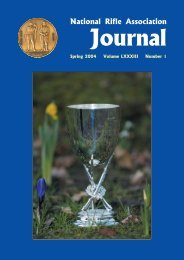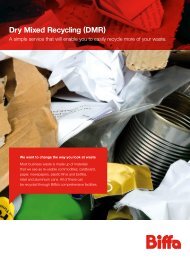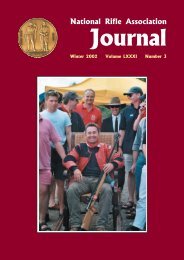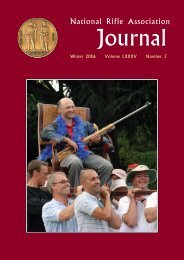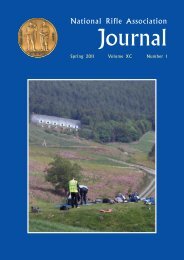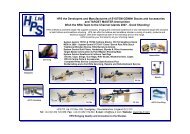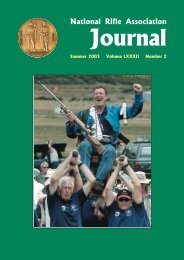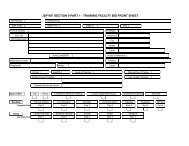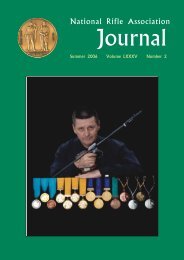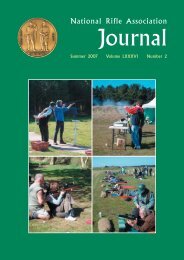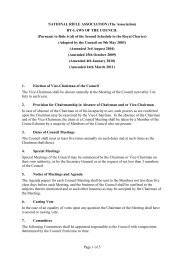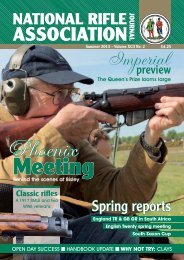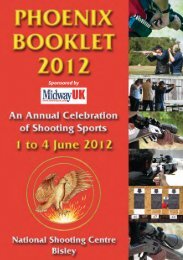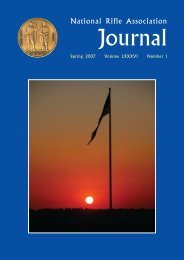NRA Journal - Summer 2004 - National Rifle Association
NRA Journal - Summer 2004 - National Rifle Association
NRA Journal - Summer 2004 - National Rifle Association
- No tags were found...
Create successful ePaper yourself
Turn your PDF publications into a flip-book with our unique Google optimized e-Paper software.
OBITUARIESMichael ThrelfallHeathcote (GC, SC)Michael was born on 14June 1914 at ApsleyHouse, Disley, Cheshire;his father was a physicianand surgeon. He attendedTrent College, Nottinghamfor his educative yearswhere his love for targetrifle shooting developed.He was a member of thecadet rifle team to Bisleyfor a number of years.After college, Michael joined the Westminster Bank andwith his adventurous spirit it was not long before heapplied to the Standard Bank of South Africa which hejoined in 1939 in Cape Town. After three years heapplied, and was transferred to, the same bank inSouthern Rhodesia. Michael’s love for target rifleshooting grew and it was not long before he was chosento represent his country at Bisley in 1950. He representedRhodesia further in 1955, 1960 and 1965 and it was inthat year that the Rhodesian team achieved the uniquehonour of winning all the major international teamevents against the Mother Country and the BritishCommonwealth; this included, of course, the Kolapore,Mackinnon and Overseas.He developed a strong interest in local government andwas involved on a number of parliamentary and localgovernment committees.At the Unilateral Declaration of Independence inRhodesia in 1965 and because of his strong belief in justgovernment, Michael decided to leave his belovedRhodesia and return to England. His passion for rifleshooting took him to Bisley where he became a regularmember of the Surrey <strong>Rifle</strong> <strong>Association</strong> which soonearned him a cap in the Great Britain rifle team. Michaelsoon joined the North London <strong>Rifle</strong> Club and in his lateryears did a fantastic job as Captain and was elected as aVice-President of the club.His shooting history was awesome and after his returnto England he won the Grand Aggregate Gold Cross in1971, the Silver Cross in 1975, shot four times in theKolapore and the <strong>National</strong>, once in the Mackinnon andwas a member of the Palma team to Canada and theUSA in 1976. Individually he shot in the Queen’s Finalfive times, coming third in 1972, finished in the top fiftyof the Grand Aggregate six times and finished in the toptwenty-five of the St George’s twice.In his later years his health caused him to retire fromshooting but his love of steam locomotives took him tothe Bluebell Railway where he could sometimes be seenat the age of eighty clambering up a signal tower torenovate and to paint. He also worked for the Children’sHope Foundation for four days a week until he died on28 March <strong>2004</strong>.Michael was very supportive of all who shared his loveof and enthusiasm for our sport. He regularly visitedthe NLRC each year and was present at last year’s PalmaMatch; his happy and enthusiastic demeanour will bevery much missed.HR Heathcote and Martin TownsendAlbert MaylorQMSI RM RetdFollowing a short illness,Albert (aged 88) passedaway peacefully on 14November 2003 at theRoyal Devon and ExeterHospital.Albert was born inDevonport, Plymouth.His father was in the Blackand Tans and with twobrothers joining the Merchant Navy, it was perhaps notsurprising that Albert chose a similar path, joining HMRoyal Marines in 1932.In 1935 Albert was part of the Royal Marine detachmentaboard HMS Rodney when it completed its Spring Cruiseto the Caribbean; on its return to the UK the ship wasvisited by King George V and Queen Mary in August atCowes. Albert later apparently alleged that thedeterioration of his hearing was all due to the use of theRodney’s 16” guns for Royal Salutes as firing practicesweren’t conducted wearing any ear defenders in thegood old days!In 1936 he witnessed the Fleet Review at Spithead andlater that same year was a member of the Royal Marinedetachment detailed to escort and protect Emperor HaileSelassie I of Ethiopia into exile, much of it spent in theUK because of the Italian War in Africa.In 1939 he was posted to the equally famous HMSEdinburgh which served as escort during World War Twofor the North Atlantic convoys; Albert subsequentlyreceived the Russian Convoy Medal. Later, on escortduty during the Russian Convoys, HMS Edinburgh wastorpedoed by a U-boat on 2 May 1942, when it wasallegedly carrying £45 million in gold bullion.Promoted to Corporal in 1938, Albert was promotedagain in 1941 to Sergeant and was posted to ITCRMLympstone as a weapons instructor.A career Royal Marine for 28 years, Albert achieved therank of QMSI, retiring in 1960, whilst serving for thesecond time at ITCRM Lympstone.57



